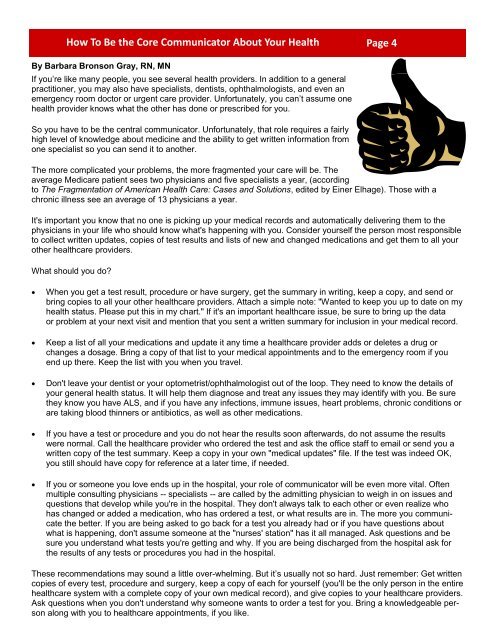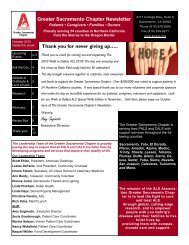June 2012 - The ALS Association Greater Sacramento
June 2012 - The ALS Association Greater Sacramento
June 2012 - The ALS Association Greater Sacramento
You also want an ePaper? Increase the reach of your titles
YUMPU automatically turns print PDFs into web optimized ePapers that Google loves.
How To Be the Core Communicator About Your Health<br />
Page 4<br />
By Barbara Bronson Gray, RN, MN<br />
If you’re like many people, you see several health providers. In addition to a general<br />
practitioner, you may also have specialists, dentists, ophthalmologists, and even an<br />
emergency room doctor or urgent care provider. Unfortunately, you can’t assume one<br />
health provider knows what the other has done or prescribed for you.<br />
So you have to be the central communicator. Unfortunately, that role requires a fairly<br />
high level of knowledge about medicine and the ability to get written information from<br />
one specialist so you can send it to another.<br />
<strong>The</strong> more complicated your problems, the more fragmented your care will be. <strong>The</strong><br />
average Medicare patient sees two physicians and five specialists a year, (according<br />
to <strong>The</strong> Fragmentation of American Health Care: Cases and Solutions, edited by Einer Elhage). Those with a<br />
chronic illness see an average of 13 physicians a year.<br />
It's important you know that no one is picking up your medical records and automatically delivering them to the<br />
physicians in your life who should know what's happening with you. Consider yourself the person most responsible<br />
to collect written updates, copies of test results and lists of new and changed medications and get them to all your<br />
other healthcare providers.<br />
What should you do?<br />
<br />
<br />
<br />
<br />
<br />
When you get a test result, procedure or have surgery, get the summary in writing, keep a copy, and send or<br />
bring copies to all your other healthcare providers. Attach a simple note: "Wanted to keep you up to date on my<br />
health status. Please put this in my chart." If it's an important healthcare issue, be sure to bring up the data<br />
or problem at your next visit and mention that you sent a written summary for inclusion in your medical record.<br />
Keep a list of all your medications and update it any time a healthcare provider adds or deletes a drug or<br />
changes a dosage. Bring a copy of that list to your medical appointments and to the emergency room if you<br />
end up there. Keep the list with you when you travel.<br />
Don't leave your dentist or your optometrist/ophthalmologist out of the loop. <strong>The</strong>y need to know the details of<br />
your general health status. It will help them diagnose and treat any issues they may identify with you. Be sure<br />
they know you have <strong>ALS</strong>, and if you have any infections, immune issues, heart problems, chronic conditions or<br />
are taking blood thinners or antibiotics, as well as other medications.<br />
If you have a test or procedure and you do not hear the results soon afterwards, do not assume the results<br />
were normal. Call the healthcare provider who ordered the test and ask the office staff to email or send you a<br />
written copy of the test summary. Keep a copy in your own "medical updates" file. If the test was indeed OK,<br />
you still should have copy for reference at a later time, if needed.<br />
If you or someone you love ends up in the hospital, your role of communicator will be even more vital. Often<br />
multiple consulting physicians -- specialists -- are called by the admitting physician to weigh in on issues and<br />
questions that develop while you're in the hospital. <strong>The</strong>y don't always talk to each other or even realize who<br />
has changed or added a medication, who has ordered a test, or what results are in. <strong>The</strong> more you communicate<br />
the better. If you are being asked to go back for a test you already had or if you have questions about<br />
what is happening, don't assume someone at the "nurses' station" has it all managed. Ask questions and be<br />
sure you understand what tests you're getting and why. If you are being discharged from the hospital ask for<br />
the results of any tests or procedures you had in the hospital.<br />
<strong>The</strong>se recommendations may sound a little over-whelming. But it’s usually not so hard. Just remember: Get written<br />
copies of every test, procedure and surgery, keep a copy of each for yourself (you'll be the only person in the entire<br />
healthcare system with a complete copy of your own medical record), and give copies to your healthcare providers.<br />
Ask questions when you don't understand why someone wants to order a test for you. Bring a knowledgeable person<br />
along with you to healthcare appointments, if you like.













